
Police in Portland, Oregon’s largest city, are being advised to no longer pursue low-level traffic infractions — including expired plates and broken headlights — unless related to an immediate safety threat, Portland Mayor Ted Wheeler and Police Chief Chuck Lovell announced Tuesday.
According to the changes to the Portland Police Bureau (PPB) protocols, officers will no longer prioritize making traffic stops for the enforcement of low-level traffic infractions, such as expired tags or minor equipment issues, that aren’t immediate public safety threats. Also, officers will follow new consent search protocols that will “help ensure residents are aware of their Fourth Amendment rights.” If police do stop a driver, they must receive recorded consent before searching the vehicle and clearly inform the person they have the right to refuse.
Police Chief Lovell has instructed his officers to not pull citizens over for “less serious, non-moving violations” and instead focus on those who are making the road unsafe for others, including anyone driving under the influence and reckless drivers.
“I don’t want to over promise the results on the disparities because I’m not sure what those will be,” said Lovell. “What I think what’s important here is that we’re willing to try this. We’re willing to ask officers to do it and look at the data and see if it’s having an impact on safety, if it’s having an impact on disparities and then making appropriate judgements from there.”
Lovell said that these changes, specifically regarding violations, will improve the rate of traffic fatalities along with the city’s ability to police equitably. According to the Portland Bureau of Transportation (PBOT), the city has seen a 47-percent increase in traffic deaths in 2021, compared to this same time in 2020 — an increase from 17 deaths to 25. Directing officers to focus on only pulling over people for violations that threaten safety will free up officers’ time to prioritize driving issues that could turn fatal.
Mayor Wheeler stated that the changes are the city’s response to their findings of disproportionate statistics, which showed black drivers accounted for 18 percent of traffic stops in the city, while black people only make up six percent of the city’s population. In 2019, Portland’s black citizens made up nearly 23 percent of stops for non-moving violations compared to 62 percent of white people.
“The goal of these two changes is to make our city both safer and more equitable,” said Wheeler, who apparently was operating on the premise that the disproportionate statistics was a result of inequitable policing, as opposed to a result of one racial group committing disproportionately more traffic violations than another.
Another reason for the changes, per Wheeler, was the bureau’s limited staffing and resources. “We need to acknowledge the reality that we have a scaled-down bureau, and therefore we need to focus on our top public safety priorities,” he said. “We don’t have the resources at this point to squander on anything other than the important mission of protecting the public’s safety.
Currently the police bureau, which is struggling to find its grounding in the ultra-liberal city, is at its lowest staffing in decades — the department is around 150 officers short of “authorized strength.” Police officers have been leaving the forces in “unprecedented” numbers since the “racial justice” protests over the death of George Floyd last year, opting to forego service time toward their retirement and take lower-paying jobs in smaller towns, citing poor working conditions. Last July, the Portland City Council cut the police budget by $15 million, and eliminated 84 positions under pressure from the “Defund the Police” movement, and cut $11 million more due to the COVID-19 budget issues. Just last week, the bureau’s entire crowd-control unit — 50 people — resigned from the unit after a fellow officer was indicted on a protest assault charge.
The local outlet OregonLive reported that the decision to stop enforcing minor traffic violations was made after the Oregon House Bill 2002, which would have called for similar changes to police traffic enforcement statewide, failed to gain enough support among state legislators and was rejected. The outlet states that the Black Indigenous and People of Color Caucus, as well as grassroots organizations that supported the bill, were disappointed that the legislation was tanked. In a joint statement, they called it a “a profoundly disappointing setback for Oregonians who value and have called for racial justice and changes in our approach to community safety.”
Portland is not the first large city to make such a move regarding traffic stops. Oakland, California, has adopted similar policies in 2019 to “curb racial biases.”
In Berkeley, California, the city council voted last year to direct police to no longer stop drivers for minor traffic violations including equipment violations, expired vehicle registrations or not wearing a seat belt, also citing “racial disparities” among the violators.




